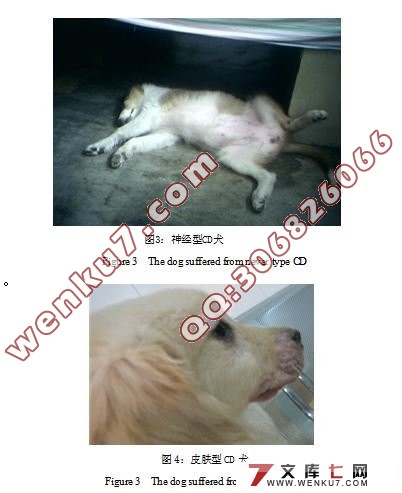株洲地区犬瘟热流行病学调查与治疗研究
来源:wenku7.com 资料编号:WK78022 资料等级:★★★★★ %E8%B5%84%E6%96%99%E7%BC%96%E5%8F%B7%EF%BC%9AWK78022
以下是资料介绍,如需要完整的请充值下载。
1.无需注册登录,支付后按照提示操作即可获取该资料.
2.资料以网页介绍的为准,下载后不会有水印.资料仅供学习参考之用. 密 保 惠 帮助
资料介绍
株洲地区犬瘟热流行病学调查与治疗研究(12000字)
摘 要:为了解2009年6月到2010年5月间株洲地区犬瘟热发病率、死亡率与犬年龄、品种、免疫接种、季节之间的关系,探讨治疗犬瘟热最有效的方法。本研究收集150例临床犬瘟热病例,进行了流行病学分析和治疗。结果表明,犬瘟热发病率及死亡率与犬的年龄、品种、免疫接种、季节有很大的关系。通过应用被动免疫(犬瘟热血清、犬瘟热单克隆抗体) 联合主动免疫(弱毒疫苗) 的治疗方法取得了良好的治疗效果。
关键词:犬瘟热;流行病学;病理变化;治疗;
Epidemiological Investigation&Therapy of Canine Distemper in Zhuzhou
Abstract:To get the relationship between morbidity , fatality of canine distemper and the age ,species , immunifaction of dog and the seasons in Zhuzhou from June 2009 to May 2010 , get a suit of effective method to cure canine distemper , 150 cases of canine distemper cases were analyzed and the popular therapy. The result demonstrate that there were closeness relationship between morbidity , fatality of canine distemper to the age , species , immunifaction of dog and seasons. It could be effective get the treatment were effective through using passive immunity (blood serum of canine distemper ,monoclonal antibody of canine distemper) and active immunity (vaccine of feeble toxicum) .
Key words : canine distemper ; epidemiology ; pathological change ; treatment

目 录
摘要………………………………………………………………………………1
关键词……………………………………………………………………………1
1 前言……………………………………………………………………………1
2 材料与方法……………………………………………………………………5
2.1 实验材料 …………………………………………………………………5
2.1.1 病例………………………………………………………………………5
2.1.1 器械………………………………………………………………………5
2.1.3 药品 ……………………………………………………………………5
2.2 实验方法………………………………………………………………… 5
2.2.1 临床初步诊断方法………………………………………………………5
2.2.2 使用犬瘟热病毒快速检测盒进行病毒检测………………………… 6
2.2.3 临床诊断方法………………………………………………………… 6
2.2.4 流行病学调查方法………………………………………………………8
2.2.5 治疗方法……………………………………………………………… 9
2.3 病例剖检………………………………………………………………… 10
3 实验结果…………………………………………………………………… 10
3.1 流行病学调查结果……………………………………………………… 10
3.1.1 犬瘟热发病、死亡与年龄的关系………………………………………10
3.1.2 犬瘟热发病、死亡与品种的关系………………………………………11
3.1.3 犬瘟热发病、死亡与季节的关系………………………………………12
3.2 治疗结果………………………………………………………………… 12
3.3 病例剖检结果…………………………………………………………… 13
4 讨论………………………………………………………………………… 13
参考文献 ………………………………………………………………………14
致谢……………………………………………………………………………15
|



